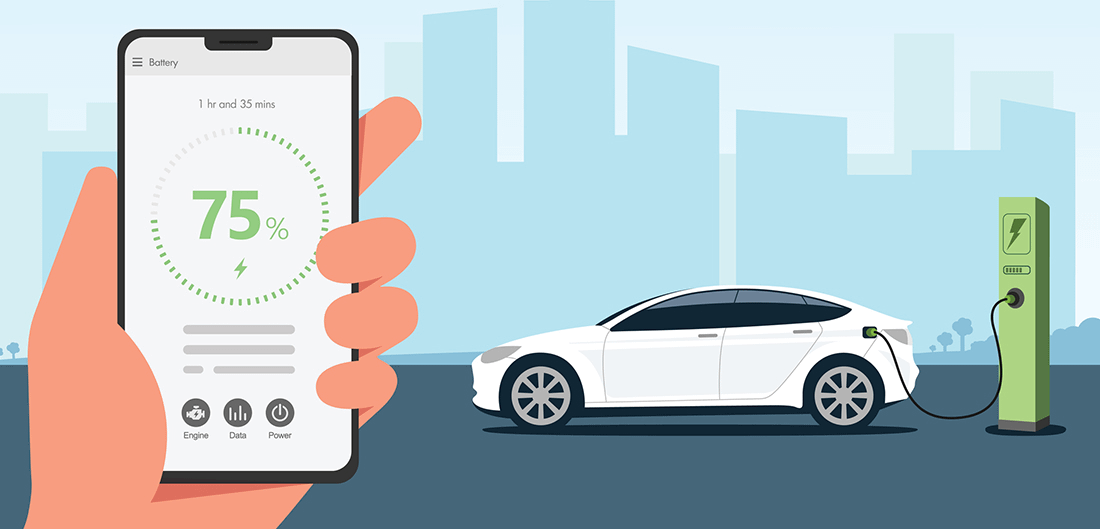
When you buy an electric vehicle (EV), you gain benefits – no more trips to the gas station – and some new responsibilities … like keeping that vehicle charged properly so you can predictably reach destinations.
The most important element of the EV is the battery pack because it powers everything in the vehicle. While each brand of EV offers recommendations on extending and preserving battery life, there are some general practices that all EV owners can follow to enhance the performance of their cars.
How Long do EV Batteries Last?
EVs are powered by lithium-ion batteries, and battery output is measured in kilowatt-hours (kWh). According to Blackridge Research & Consulting, most EV batteries fall in the 30 to 100 kWh range and, on average, last up to 65,000 or more total miles. Each manufacturer has a different battery pack and expected life.(On average, EV batteries lose 2.3% of their starting range annually.)
The range of miles an EV can travel at one time depends on a variety of factors, including the features in use by the vehicle (heated seats, interior air conditioning, etc.), speed, terrain, the weight of the vehicle and its contents and weather conditions. Extremely high or low external temperatures can dramatically affect the life of EV batteries, so it is important to plan ahead when your weather app predicts spikes or drops in temperature.
Read more about optimizing your EV battery life in the winter.
Tips for Extending Your EV Battery Life
While suggestions vary among EV manufacturers, some common practices can help extend both driving ranges and total battery life.
Avoid high and low battery charges. It is best to charge the batteries to 80% and not allow it to drop below 20%. According to J.D. Power, this 80/20 rule will provide acceptable daily driving ranges while extending battery life.
You can preset your car’s maximum charging setting to 80%, keeping you from over-charging the battery during daily use.
Most manufacturers suggest limiting DC (fast/high-speed) charging to emergencies or longer road trips. The batteries are designed for longer charges, so fast charges, while convenient, may push too much current into the battery pack, causing premature deterioration.
Maintain your vehicle. EV battery life is directly tied to car maintenance. Keep your tires at the proper pressure, especially during cold weather. Take the vehicle in for routine maintenance. Clear snow and ice off the exterior. Simple, consistent maintenance steps can help preserve battery life. Park your EV in a garage, if possible. It helps protect the vehicle from temperature extremes and lessens the work you’ll have to do to clean it off.
Go back to the basics. Applying some driving school lessons could pay off if you drive an electric vehicle. Slow acceleration is safer – and more energy efficient for EV batteries – than fast take-offs. Excessive speeds, sudden braking and other bad driving habits can drain battery life, not to mention put you at risk for accidents.
Preparation Pays Off
In the coming years, EV batteries will continue to evolve with longer driving ranges and overall life. In the meantime, care for your EV by following the recommendations for your vehicle’s battery, driving safely and caring for your car overall.
Prepare for the worst by considering Emergency Roadside Service coverage1. With this economic coverage, you have access to towing companies 24/7. Talk to your local agent about adding this coverage to your comprehensive or collision policy.
Want to learn more about policies for your vehicle? Discover great rates from local people who care. Give us a call today.
ERIE® insurance products and services are provided by one or more of the following insurers: Erie Insurance Exchange, Erie Insurance Company, Erie Insurance Property & Casualty Company, Flagship City Insurance Company and Erie Family Life Insurance Company (home offices: Erie, Pennsylvania) or Erie Insurance Company of New York (home office: Rochester, New York). The companies within the Erie Insurance Group are not licensed to operate in all states. Refer to the company licensure and states of operation information.
The insurance products and rates, if applicable, described in this blog are in effect as of January 2024 and may be changed at any time.
Insurance products are subject to terms, conditions and exclusions not described in this blog. The policy contains the specific details of the coverages, terms, conditions and exclusions.
The insurance products and services described in this blog are not offered in all states. ERIE life insurance and annuity products are not available in New York. ERIE Medicare supplement products are not available in the District of Columbia or New York. ERIE long term care products are not available in the District of Columbia and New York.
Eligibility will be determined at the time of application based upon applicable underwriting guidelines and rules in effect at that time.
Your ERIE agent can offer you practical guidance and answer questions you may have before you buy.

A better insurance experience starts with ERIE.
Haven’t heard of us? Erie Insurance started with humble beginnings in 1925 with a mission to emphasize customer service above all else. Though we’ve grown to reach the Fortune 500 list, we still haven’t lost the human touch.
Contact Integrated Insurance Solutions today to experience the ERIE difference for yourself.
